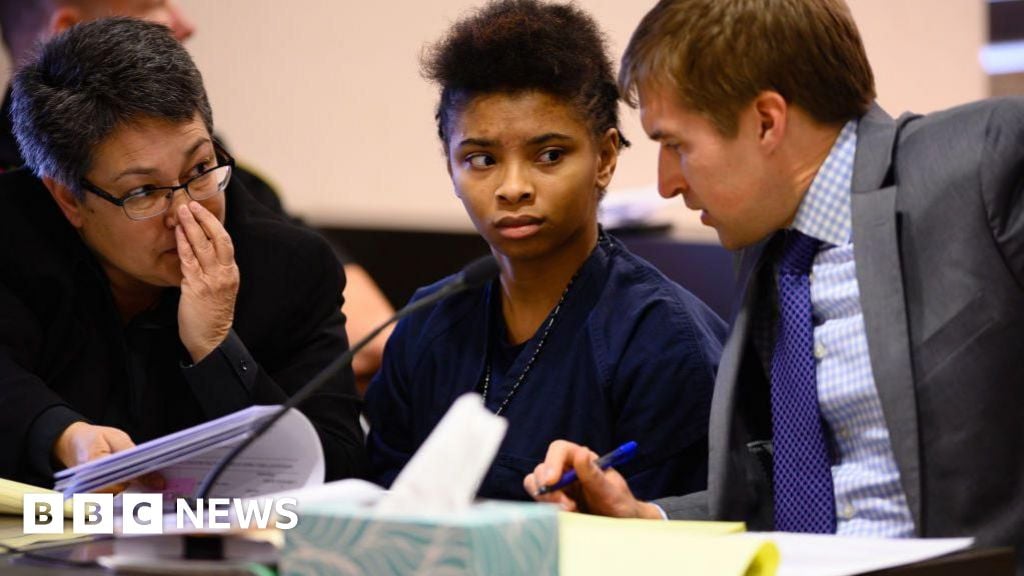A Milwaukee woman has been jailed for 11 years for killing the man that prosecutors said had sex trafficked her as a teenager.
The sentence, issued on Monday, ends a six-year legal battle for Chrystul Kizer, now 24, who had argued she should be immune from prosecution.
Kizer was charged with reckless homicide for shooting Randall Volar, 34, in 2018 when she was 17. She accepted a plea deal earlier this year to avoid a life sentence.
Volar had been filming his sexual abuse of Kizer for more than a year before he was killed.
Kizer said she met Volar when she was 16, and that the man sexually assaulted her while giving her cash and gifts. She said he also made money by selling her to other men for sex.



Right, that’s my point – jury nullification is the mechanism by which juries find that a crime was committed by the letter of the law but the defendent is not guilty.
Interesting. I’d never heard of this.
A quick read of this wikipedia article makes it sound very sovereign citizen.
This part is particularly salient:
Basically, a jury’s one job is to determine whether, based on the facts, a person committed a crime. “Jury Nullification” is a perversion of that role. It may be “just” but it’s not justice.
If Jury Nullification is a thing, then essentially juries can decide the law in any given case. What’s the point of laws? You could just have public kangaroo courts where citizens decide the fate of the accused based on the vibe.
That’s basically what white juries have been doing for the KKK since Reconstruction. One reasonable argument for nullification is that dishonest jurors will just vote “not guilty” anyways and aren’t required to justify their reasoning. So nullification tips the scales to give honest jurors the same power to acquit a woman who didn’t do anything morally wrong.
If the races involved were reversed, she’d be walking free.
Your summary seems to imply that whatever happens to currently be written into law is considered “justice”. But we’ve always known that the law is not perfect and needs constant corrections for true fairness.
Jurors, laws, judges, witnesses, none of them are perfect. Each has stoked fears that they will overpower the rights of the others. Courts do their best to have each balancing the power of the other.
Justice is a tricky word because it can mean justice as in a fair and equitable outcome or it can mean justice as in the outcome provided by the established justice system which we both know is frequently “un-just”.
If you read what I wrote as “whatever outcome the law provides is just” then either I’ve explained myself very poorly or you’ve misunderstood.
I don’t disagree with any of this. The manner in which power is balanced is to segregate the role of the different components of the court. It is the role of the jury to determine whether the defendant is guilty of the crimes they are charged with. If a Jury is allowed to determine whether the punishment for the defendant’s crimes is reasonable given the circumstances then that jury has all the power, and there is no balance.
Sov Cits try to use it all the time but it usually doesn’t work for them.
However it has been used to prevent convictions for unfair laws in the past. Juries used to use it to prevent people who harbored escaping slaves from being convicted for example.
I don’t have experience with it personally, only heard about it from a possibility perspective – apparently prosecutors do a very thorough job screening jurors to make sure that never happens. Just knowing about jury nullification can get you dismissed. I don’t think you’re off the mark with that read, but where I think it comes back from kangaroo court and sov cit land is all jurors have to agree, even one objection to a nullification would stop it; if twelve strangers all agree, there’s probably some merit to it. But, certainly can be abused in the wrong hands.
That’s because it’s not really a thing.
The jury doesn’t have the option of finding guilty, or not guilty, or nullify.
If you ask a potential juror, “will you do your job of finding the accused guilty or not guilty?” and their answer is “what about nullification?” then they’re basically telling you that they do not understand the requirement and are incapable of performing the job.
Nullification is finding them not guilty, in this case due to the whole story.
It’s not, it’s saying they are not guilty in order to avoid penalties for the defendant, despite knowing that they perpetrated the crime. That is quite obviously a perversion of the court.